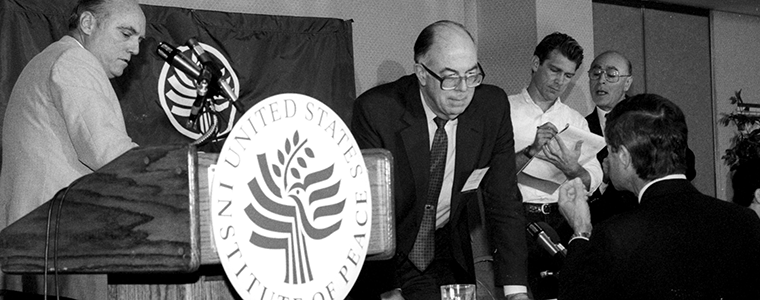In Memoriam: Harold Saunders
The United States Institute of Peace is saddened by the death of a valued colleague, diplomat and peacemaker Harold Saunders. As an assistant secretary of state during the Carter administration, Hal was a primary architect of the 1978 Camp David Accords between Israel and Egypt. For decades, both in and out of public office, Hal was a leader of U.S. peace efforts in the Middle East, the former Soviet Union and elsewhere. He was a visionary as well as a practitioner, developing a process called “sustained dialogue” for peacemaking in destructive conflicts

“Hal was a true wise man, and a pillar in the world of peacebuilding and mediation,” said USIP President Nancy Lindborg. “When things were going crazy, you could count on him to be a calm, clear and compassionate voice. He was unflappable and unswerving in his belief that there was a pathway to peace."
Harold H. Saunders served as assistant secretary of state from 1978 to 1981, and was part of the painstaking negotiations between Israeli Prime Minister Menachem Begin and Egyptian President Anwar Sadat that led, through 23 drafts, to the Camp David accords, in which Israeli returned the Sinai Peninsula to Egypt in exchange for peaceful, diplomatic relations with its most powerful Arab neighbor. He served in many other senior U.S. foreign policy positions over two decades.
Out of office, Hal pursued and taught peacemaking as a university professor and as a leader of the long-running Dartmouth Conference dialogues between prominent U.S. and Soviet intellectuals. He built on those dialogues to pursue a peace process that helped end a civil war in the ex-Soviet Central Asian nation of Tajikistan in the 1990s. Hal founded and led the Washington-based Sustained Dialogue Institute to promote such peacemaking more broadly, and the sustained dialogue model has been used to address racial and other issues on university campuses in the United States and abroad.
Hal worked closely with the U.S. Institute of Peace, offering his counsel throughout the years. Some of that was captured in an authoritative book on peacemaking in the Middle East—The Other Walls: The Arab-Israeli Peace Process in a Global Perspective, for which USIP provided support. He contributed to other USIP books on peacemaking and mediation, including Managing Global Chaos (1996), Herding Cats (1999),and Turbulent Peace (2001). Hal was a member of the Institute’s working group on intractable conflicts.
